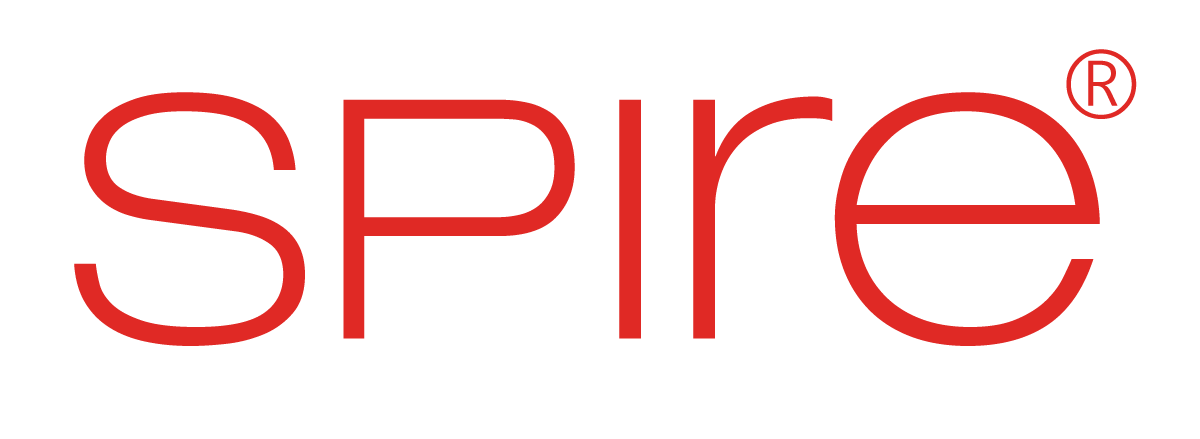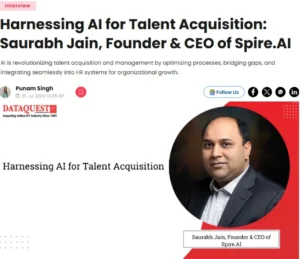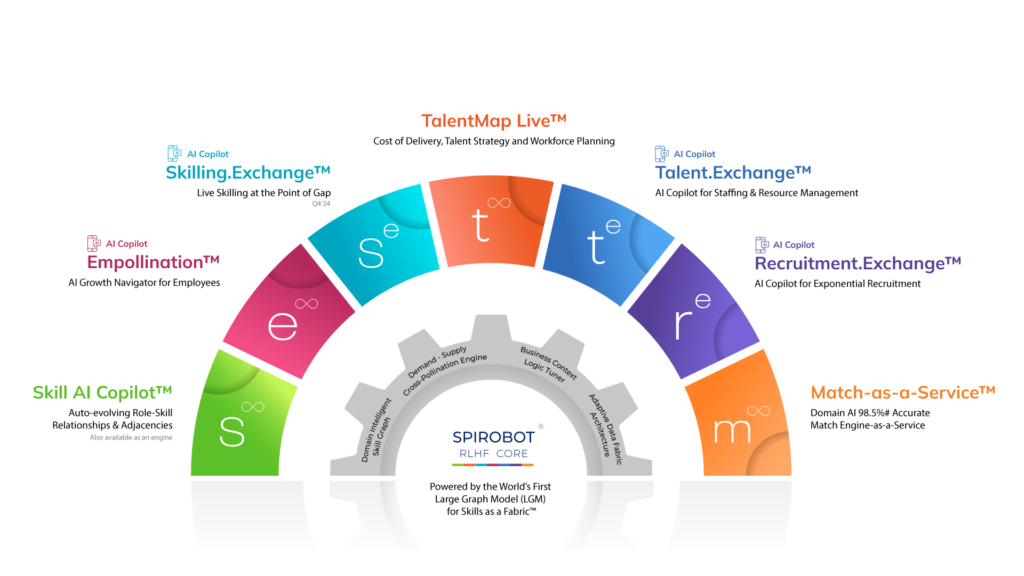Read insights by our CEO, Mr. Saurabh Jain, about how organizations can leverage Domain-Intelligent AI to create a sustainable and high-impact talent acquisition operating model in this exclusive interview with Dataquest –
Link to article: Harnessing AI for Talent Acquisition: Saurabh Jain, Founder & CEO of Spire.AI
The talent landscape is undergoing a seismic shift. The “Great Resignation” has reshuffled priorities, the skills gap has widened, and emerging technologies are changing the recruitment game. To stay ahead of the curve, companies must embrace talent acquisition trends that prioritize efficiency, inclusivity, and data-driven decision-making. This blog dives into the hottest trends transforming recruitment in 2025, empowering you to build a solid and sustainable hiring strategy.
What are Talent Acquisition Trends?
Talent acquisition trends encompass the evolving strategies and technologies shaping how organizations attract, assess, and acquire top talent. In today’s competitive environment, staying abreast of these trends is crucial for attracting and retaining the best employees.
Revolutionizing Talent Acquisition – Trends to Watch Out For
“Looking ahead, intelligent, data-driven technologies will revolutionize the future of talent and HR. Domain-intelligent Artificial Intelligence (AI) will lead this transformation, fundamentally changing how organizations acquire, manage, deploy, reskill, and grow talent.” – Mr. Saurabh Jain, CEO, Spire.AI
1. The Rise of Domain-Intelligent AI
One of the most significant talent acquisition trends is the rise of domain-intelligent AI. These AI systems are trained on vast amounts of industry-specific data, enabling them to automate repetitive tasks, identify top talent, and streamline recruitment, keeping specific business and industry contexts in mind.
Here’s how Domain Intelligent AI is transforming talent acquisition:
- Screening: AI-powered pre-screening assessments can efficiently filter through a large pool of applicants, saving recruiters valuable time and resources.
- Matching: AI algorithms can match candidates with open positions based on their skills, experience, and cultural fit. This helps ensure a better fit for both the company and the candidate.
- Onboarding: AI chatbots can assist in answering new hires’ questions and guide them through onboarding, freeing up HR professionals to focus on more strategic initiatives.
The Power of Partnership: Human and Machine Collaboration
While AI offers undeniable benefits, it’s important to remember that it’s a tool, not a replacement for human expertise. The most effective approach leverages the strengths of both AI and human intelligence. Here’s how this collaboration plays out:
- Strategic Guidance: HR professionals define the parameters for AI tools, ensuring they align with the company’s recruitment goals and talent needs.
- Data Interpretation: AI can analyze vast amounts of data, but human expertise is crucial for interpreting the results and making informed decisions.
- Candidate Experience: Building relationships and fostering a positive candidate experience remain human domains. AI can automate tasks, but recruiters must build rapport, answer questions, and showcase the company culture.
- Ethical Considerations: AI algorithms can perpetuate existing biases if not carefully designed and monitored. Human oversight is crucial to ensure ethical and fair recruitment practices.
2. Skill-Based Talent Acquisition
The traditional talent acquisition approach, heavily reliant on degrees and experience, gives way to a skill-based revolution. This shift recognizes that specific skills, not just years on a resume, determine a candidate’s ability to excel in a role. Here’s how domain-intelligent AI is leading the charge in this exciting new era of recruitment:
- AI-powered Skills Identification: Recruiters no longer need to scan through piles of resumes filled with subjective descriptions. AI can analyze vast data, including job descriptions, industry benchmarks, and online skills databases. This allows AI to identify top skills for every role, accurately evaluating a candidate’s proficiency in the specific skillsets required for the position.
- Reduced Screening Burden: Imagine a world where you don’t have to screen hundreds of resumes to identify qualified candidates. Domain-Intelligent AI, like Spire.AI, can auto-screen resumes for your specific business context and automatically determine every candidate’s expert, advanced, and proficient skills. This frees up recruiters’ valuable time to focus on high-potential candidates and engage in meaningful conversations.
- Faster Candidate Identification: By automating the initial screening process and prioritizing skills, AI can significantly reduce the time it takes to identify qualified candidates. This allows companies to move faster in the hiring process, filling open positions quickly and minimizing the risk of losing top talent to competitors.
- Enhanced Recruiter Productivity: With AI handling the repetitive tasks of resume screening and initial candidate evaluation, recruiters are empowered to focus on the strategic aspects of talent acquisition. This includes building relationships with top candidates, conducting in-depth interviews, and making informed hiring decisions.
The Human Touch: Guiding the AI Revolution
While AI plays a transformative role in skill-based talent acquisition, it’s important to remember that human expertise remains essential. Recruiters still play a crucial role in:
- Defining Skill Requirements: After AI helps set clear and concise skill requirements for each position, recruiters must verify them to ensure they align with their needs.
- Evaluating Soft Skills: While AI excels at evaluating hard skills, human interaction remains vital for assessing soft skills like communication, teamwork, and problem-solving.
- Making Hiring Decisions: Ultimately, the final decision on who gets hired lies with human recruiters who can consider all aspects of a candidate’s qualifications and cultural fit.
By leveraging the power of AI in this way, talent acquisition teams can achieve a perfect balance – identifying skilled candidates faster with minimal human intervention while ensuring the human touch remains at the heart of the skills-based hiring process.
3. Building Inclusive Talent Pipelines
Diversity and inclusion (D&I) are no longer just buzzwords. Companies are prioritizing building inclusive talent pipelines to attract a wider pool of qualified candidates.
Here’s how to cultivate an inclusive talent acquisition strategy:
- Unconscious bias training: mplementing unconscious bias training for hiring managers and recruiters helps mitigate bias throughout recruitment.
- Diversity sourcing: Partnering with diversity-focused organizations and job boards helps expand your talent pool and attract a wider range of candidates. This could include organizations focused on women in tech, veterans, or people with disabilities.
- Inclusive job descriptions: Use inclusive language that avoids gendered terms or stereotypes. Highlight your company’s commitment to diversity and inclusion within the job description.
- Standardized interview process: Developing a standardized interview process ensures that all candidates are evaluated using the same criteria. This helps mitigate bias and provide a fair hiring process.
4. Internal Mobility and Upskilling
Developing and empowering your existing workforce through internal mobility and upskilling programs is critical for long-term success. This upcoming trend has picked up in 2025 with Domain-Intelligent AI. Here’s how this powerful technology is transforming internal mobility and upskilling:
Domain-Intelligent AI: A Personalized Learning Revolution
This innovative technology goes beyond basic skills assessments. Drawing on vast amounts of industry-specific data, Domain-Intelligent AI can:
- Identify Skills Gaps: Domain-intelligent AI can pinpoint individual and team-wide skills gaps within the organization by analyzing employee performance data, project assignments, and self-reported skills.
- Personalized Learning Pathways: Leveraging its understanding of your workforce and industry needs, Domain-Intelligent AI can recommend customized learning pathways for each employee. These pathways could include online courses, internal training programs, or mentorship opportunities.
- Career Path Simulations: Domain-intelligent AI can also recommend career path simulations for growth within the organization for each employee, aligned with their career aspirations and company goals.
AI-Driven Matching: Identifying the Perfect Fit
When an internal position opens up, AI can quickly match the requirements of the role with the skills and aspirations of your existing workforce. This allows for a more efficient and effective internal mobility process with several benefits:
- Faster Time-to-Fill: By identifying qualified internal candidates, you can fill open positions quicker, minimizing disruptions and maintaining business continuity.
- Reduced Recruitment Costs: Hiring internally is significantly cheaper than external recruitment, freeing up valuable budget resources.
- Enhanced Employee Engagement: Promoting from within demonstrates your commitment to employee development, fostering loyalty and engagement.
5. Prioritizing Security and Compliance
With more data being collected and used throughout the recruitment process, ensuring security and compliance is paramount.
- Data security: Implement robust security measures to protect sensitive candidate information. This includes encrypting data, restricting access, and implementing strong password policies.
- Compliance with regulations: Stay up-to-date on data privacy regulations and ensure your recruitment practices comply with all applicable laws.
“Security and compliance will be paramount, with robust measures in place to safeguard the sensitive information personal information of employees and candidates.” – Mr. Saurabh Jain, CEO, Spire.AI.
The Importance of Trust and Transparency
Building trust with candidates is essential in today’s job market. Here’s how:
- Transparency throughout the process: Keep candidates informed about their application status and the hiring process timeline.
- Clearly defined job descriptions: Job descriptions should accurately reflect the requirements and responsibilities of the position.
- Data privacy commitment: Clearly communicate how you collect, use, and store candidate data.
Building a Winning Talent Acquisition Strategy
To leverage the power of talent acquisition trends effectively, consider these tips:
- Start with your business goals: Clearly define your company’s talent needs and align your recruitment strategy with those goals.
- Invest in the right technology: Choose AI tools specifically designed for your industry and recruitment needs. Not all AI solutions are created equal, so conduct thorough research before purchasing.
- Develop a data-driven approach: Use data to track your recruitment metrics, such as time-to-hire, cost-per-hire, and candidate quality. This data can help you identify areas for improvement and optimize your recruitment process.
- Build a strong employer brand: A positive employer brand attracts top talent. Showcase your company culture, employee benefits, and commitment to diversity and inclusion through engaging content on your careers page and social media channels.
- Foster a culture of continuous learning: Invest in your current workforce by offering training and development opportunities to help them stay ahead of the skills curve. This demonstrates your commitment to employee growth and development.
Conclusion: Embrace the Talent Acquisition Revolution
The talent acquisition trends discussed in this blog offer a roadmap for building a robust and future-proof hiring strategy. By embracing intelligent technologies, prioritizing skills, fostering inclusivity, and investing in your current workforce, you can attract top talent and build a competitive edge in the dynamic job market. Remember, the future of HR is intelligent, strategic, and inclusive.







